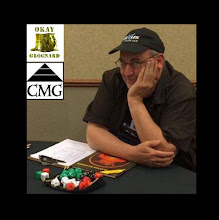The description from Board Game Geek is as follows:
Glass Road is a game that commemorates the 700-year-old tradition of glass-making in the Bavarian Forest. (Today the Glass Road is a route through the Bavarian Forest that takes visitors to many of the old glass houses and museums of that region.) You must skillfully manage your glass and brick production in order to build the right structures that help you to keep your business flowing. Cut the forest to keep the fires burning in the ovens, and spread and remove ponds, pits and groves to supply yourself with the items you need. Fifteen specialists are there at your side to carry out your orders...
The game consists of four building periods. Each player has an identical set of fifteen specialist cards, and each specialist comes with two abilities. At the beginning of each building period, each player needs to choose a hand of five specialists. If he then plays a specialist that no other player has remaining in his hand, he may use both abilities of that card; if two or more players play the same specialist, each of them may use only one of the two abilities. Exploiting the abilities of the specialists lets you collect resources, lay out new landscape tiles (e.g., ponds and pits), and build a variety of buildings. There are three types of buildings:
1. Processing buildings
2. Immediate buildings with a one-time effect
3. Buildings that provide bonus points at the end of the game for various accomplishments
Mastering the balance of knowing the best specialist card to play and being flexible about when you play it – together with assembling a clever combination of buildings – is the key to this game.
The double-rondel mechanic is very intriguing though I find it might distract me a bit from the acquisitions and the playing areas of my opponents. Not a fault of the game, just me getting too deep in my own head space and not watching down field. It didn't actually hurt my game play this time because we played two players and we were not competing for the same things. In a game with more players I would have likely missed getting a few things and been scooped by others.
Mostly about card games and board games,
unless they have a decidedly wargamey feel.
unless they have a decidedly wargamey feel.
Please Like, Share, Plus, Tweet, Follow, and Comment!






No comments:
Post a Comment